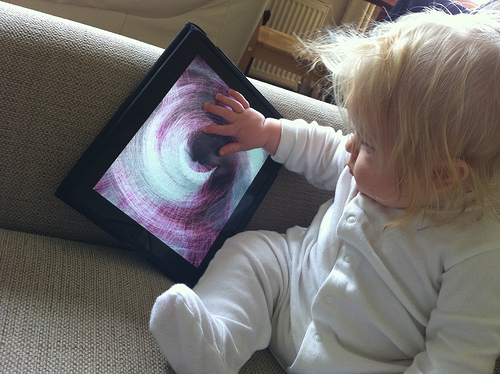There’s no doubt that apps for tablets and smartphones are useful learning tools for adults and older children. But can apps help babies and toddlers learn—or are they just entertainment?
According to the non-profit Campaign for a Commercial-Free Childhood (CCFC), marketers of apps for very young children are “playing the education card” to stimulate app sales, with no substantive evidence that their products actually teach kids anything or increase children’s’ IQs. The group has filed complaints with the US Federal Trade Commission (FTC) against two companies whose apps are market leaders: Fisher-Price and Open Solutions, saying there’s no evidence that their products have any educational value and that their marketing is lying to parents.
CCFC’s overarching goal is to hold businesses accountable for how they market technology to very young kids and their parents. But if the apps don’t actually promote learning but at least keep kids occupied and smiling, what’s the big deal? Concerns are three-fold:
- According to CCFC and others, research shows that “the more time babies spend with screen media, the less time they spend engaged in activities that are known to be educational” and proven to be educational for them.
- The American Academy of Pediatrics and others recommend against putting babies under age 2 in front of electronic screens, stating that because electronics are distracting to the parents and other adult caregivers, there’s less adult-child conversation, which is important for language development.
- While the issue of electromagnetic radiation and computing technology remains on the fringe of medical research, many doctors, scientists and parents are legitimately concerned about what impact the intense EMFs emitted by tablets and smartphones might have on the developing brains of infants and toddlers (not to mention older kids, teens and adults).
In short: little kids have short attention spans. They learn best through creative, face-to-face play. So when app-makers claim that their products will, for example, improve language acquisition, that’s a violation of truth-in-advertising laws. CCFC wants the app-makers to issue refunds to parents and change their advertising copy. Representatives from the manufacturers say their apps are appropriate for kids.
Just to see what was out there in terms of apps for babies, I “googled around” a bit and came across this “” game, which looks about as rudimentary as an app can get. The description says, “Baby can easy learning” from the app. I highly doubt that babies will learn much from this app without adult supervision and support, though it might be entertaining for them. Yet reviews for the product were positive, with parents saying it kept their kids busy so they didn’t have to interact with them.
Parents Magazine promotes a bunch of iPhone apps that they say are “fun and kid-friendly.” But do they promote learning? The “user reviews” are largely focused on whether the kids enjoy the apps and want to engage with them. But education is clearly the goal of at least some of the apps; for example, this one that teaches handwriting.
Learning tools or not, there’s no doubt that mobile devices are increasingly used to entertain kids—which means the “baby learning app” market will continue to grow whether the products really help babies learn or not.
How do you feel about baby learning apps and mobile device use by infants and toddlers? Do you hand your iPad over to your infant? Why or why not?
Featured image courtesy of David Boyle.
SAT vs ACT: Choosing the Right Test [NEW EBOOK]
Download this free 20-Page Ebook for Tutors Now!
Our free 20-page ebook is a step-by-step guide on how to select the right test for your student. Learn everything you need to know about using the PLAN and PSAT to improve student scores, how to leverage learning analytics to select one test over the other, and other tips on how to take the guesswork out of selecting the ACT vs the SAT.











